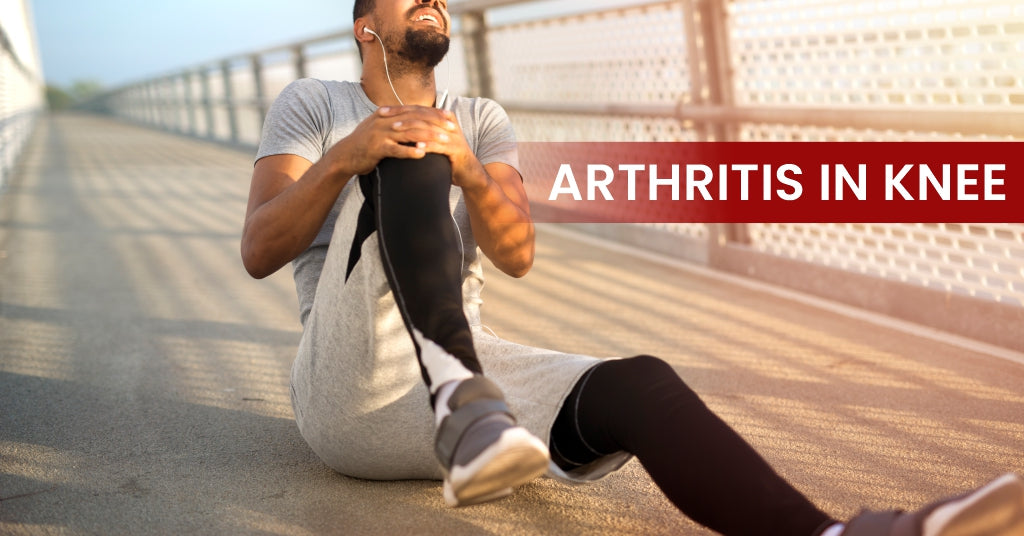Arthritis in Knee- How It Occurs and The Best Remedies to Ease It
You probably don't require much medical knowledge to figure out that you have knee pain. Many people each day complain about experiencing discomfort in their knees owing to various reasons. This often disrupts their daily life schedules and can be difficult to take care of due to Mis- or disinformation. Furthermore, some people tend to confuse Knee pain and arthritis in the knee due to a lack of proper knowledge, which keeps them away from receiving proper treatment. So, to help you with this, we have curated all that you need to know about knee arthritis, more shortly and simply. So, let's get into it.
What is Arthritis in Knee?
Arthritis, as we all know is a joint condition that causes pain, swelling and stiffness. It can affect all kinds of joints in your body, mainly the Knees. Arthritis in the knees can lead to inflammation and deterioration of the knee cartilage (a slippery cushion that allows knees to bend and straighten smoothly).
Even though there is no permanent cure for Arthritis, a few steps in the right direction might help you ease the symptoms and progression of this disorder.
Structure of Knee?

A typical knee joint is made of 3 bones. This includes-
- Femur or Thighbone
- Tibia or Shinbone
- Patella or Kneecap
The end of each bone is covered with a smooth cushion, known as cartilage. It prevents the bones from rubbing together. The synovial membrane is a tissue, surrounding the joint, which lubricates the cartilage.
Signs and Symptoms of Arthritis in Knee

The common symptoms associated with Knee arthritis are-
- Difficulty in walking - A person with Knee arthritis may often experience decreased range of motion. This is often accompanied by various sorts of noises from the knee joint such as creaking, clicking, grinding or snapping sounds.
- Redness and swelling - This symptom can occur in any type of arthritis, with its intensity depending on the degree of inflammation. One may even feel the skin to be warm in the affected area.
- Stiffness- This change or worsens with changing weather and can be especially bad during winters and mornings.
- Weakness- Certain types of Arthritis weaken the muscles, making joints unstable and legs thinner. These may cause the knees to give away when you put weight on them.
Generally, knee arthritis symptoms worsen with time.
Types of Arthritis in knee
More than 100 types of arthritis are known by mankind. However, the most common of them to affect the knees are-
- Osteoarthritis (OA)- Caused due to the wear and tear that our joints experience with age, it is also known as degenerative arthritis. It is one of the most common types of arthritis and can aggravate by an injury or disease.
- Rheumatoid Arthritis (RA)- An autoimmune condition that occurs when the body's immune system attacks the tissues of the body, causing inflammation to joints. The main reason behind facing RA can be genetics.
- Gout- This joint condition occurs on the build-up of uric acid crystals in the joint and mainly affects the big toe and knees.
- Bursitis- This term explains the inflammation of the bursae or a small fluid-filled sac near the knee joint, causing pain and immobility.
- Pseudogout- This form of Arthritis is caused by calcium-containing crystals which develop in the joint fluid.
Other causes of Arthritis in the Knee
Certain risk factors increase the possibility of Arthritis in the Knees. These include-
- Obesity or being overweight
- Lack of flexibility or strength in your muscles
- Suffering from injuries or accidents due to certain sports or occupations
Best ways to ease symptoms of Arthritis in the Knee
Even though it is impossible to completely eradicate arthritis, following suggestions that can help ease the symptoms and pain can be helpful.
Manage your weight and try to maintain it at a healthy level
Even though resting can be helpful, completely prohibiting all kinds of movement won't be helpful either. So, take a smart approach and start with light, low-impact exercises. Wear a knee pain cap for that extra support. Dr. Ortho's knee cap can be a great product to try out in that case.
Also, you can use heat therapy or cold compress for added relief.
Knee arthritis can be serious in some, so if the symptoms don't ease even after trying out preventions and home remedies, visiting a specialist can be your best option.
FAQs
What does the knee pain feel like?
Experiencing swelling, stiffness, redness, inflammation and difficulty in walking or doing any sort of movement is what a person with knee pain experiences. The symptoms and their intensity may slightly vary from person to person.
How will Dr. Ortho's knee cap help ease the pain?
The knee cap from Dr. Ortho has warm, mildly compressing abilities which help in keeping the knees warm and protected. It also gives slight support.
What is the composition of this knee cap?
Dr. Ortho Knee cap is made up of 100% skin-friendly, hypoallergenic cotton material. Its material has a glove-like fit which keeps it in one place, regardless of whatever movement you make.
What triggers the pain in Knee arthritis?
Overdoing any activity or movement, repetitive motions, weight gain, stress, or infection are a few things that can trigger the pain in knee arthritis.






